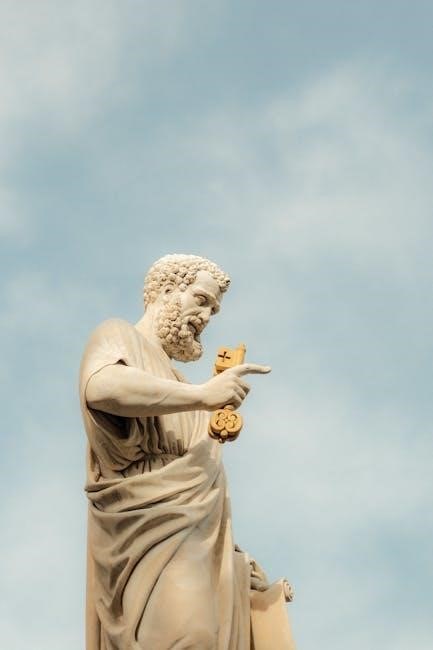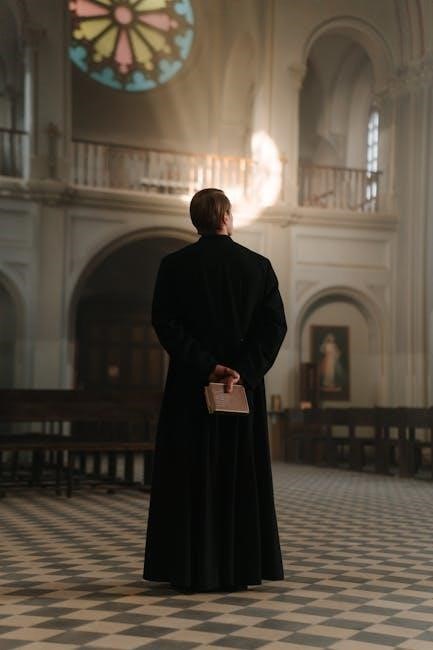The Catholic Church admits changing the Sabbath‚ a historical event with significant implications‚ as revealed in various documents and sources‚ including official church statements and historical records‚ now available online in pdf format always․
Historical Context of the Change
The historical context of the change from Saturday to Sunday as the day of worship is complex and multifaceted‚ involving a series of events and decisions made by early Christian leaders and Roman emperors․ According to historical records‚ the first change of the holy Sabbath was made by Emperor Constantine in A․D 321‚ when he declared Sunday as a day of rest and worship․ This decision was later reinforced by the Catholic Church‚ particularly during the Council of Laodicea in A․D 363‚ where the day of rest was officially changed from the seventh day of the week to the first day of the week․ The Council’s decision marked a significant turning point in the history of Christianity‚ as it established Sunday as the primary day of worship and paved the way for the widespread adoption of this practice throughout the Roman Empire․ The change had far-reaching implications for the development of Christianity and its relationship with Jewish traditions and practices․ The shift from Saturday to Sunday as the day of worship reflected the growing influence of Christianity in the Roman Empire and the desire to distinguish itself from Jewish customs and practices․ As a result‚ the Catholic Church’s decision to change the day of worship has had a lasting impact on the course of Christian history and continues to shape the practices and traditions of Christians around the world today․ The change is still acknowledged and observed by Christians worldwide‚ with Sunday remaining the primary day of worship and rest in many Christian denominations․ The historical context of the change provides valuable insights into the complex and often contentious process of establishing Christian traditions and practices․ The decision to change the day of worship reflects the dynamic and evolving nature of Christianity‚ as it adapted to changing social‚ cultural‚ and political contexts․ The legacy of this decision continues to be felt today‚ with many Christians around the world observing Sunday as a day of rest‚ worship‚ and spiritual reflection․ The Catholic Church’s admission of changing the Sabbath has sparked ongoing debates and discussions about the origins and development of Christian traditions and practices․ The historical context of the change serves as a reminder of the complex and often contested nature of Christian history‚ with different interpretations and perspectives on the significance and implications of the change․ The change from Saturday to Sunday as the day of worship remains an important topic of study and reflection‚ with ongoing implications for Christian theology‚ practice‚ and identity․ The Catholic Church’s decision to change the day of worship has had a profound impact on the course of Christian history‚ shaping the development of Christian traditions and practices in lasting and profound ways․ The historical context of the change provides a rich and complex background for understanding the evolution of Christianity and its relationship with Jewish traditions and practices․ The change from Saturday to Sunday as the day of worship continues to be observed and celebrated by Christians around the world‚ with Sunday remaining a day of rest‚ worship‚ and spiritual reflection․ The Catholic Church’s admission of changing the Sabbath has significant implications for Christian theology and practice‚ highlighting the dynamic and evolving nature of Christianity․ The decision to change the day of worship reflects the complex and often contentious process of establishing Christian traditions and practices‚ with ongoing implications for Christian identity and community․ The historical context of the change serves as a reminder of the importance of understanding and appreciating the complex and nuanced nature of Christian history‚ with its many twists and turns‚ controversies and debates․ The change from Saturday to Sunday as the day of worship remains an important and enduring part of Christian tradition and practice‚ with ongoing implications for Christian theology‚ spirituality‚ and community․ The Catholic Church’s admission of changing the Sabbath has sparked ongoing discussions and debates about the origins and development of Christian traditions and practices‚ highlighting the need for ongoing reflection‚ study‚ and dialogue․ The historical context of the change provides a valuable framework for understanding the complex and evolving nature of Christianity‚ with its many challenges and opportunities‚ controversies and debates․ The change from Saturday to Sunday as the day of worship continues to shape the practices and traditions of Christians around the world‚ with Sunday remaining a day of rest‚ worship‚ and spiritual reflection․ The Catholic Church’s decision to change the day of worship has had a lasting impact on the course of Christian history‚ with ongoing implications for Christian theology‚ practice‚ and identity․ The historical context of the change serves as a reminder of the importance of understanding and appreciating the complex and nuanced nature of Christian history‚ with its many complexities and challenges․ The change from Saturday to Sunday as the day of worship remains an important part of Christian tradition and practice‚ with ongoing implications for Christian spirituality‚ community‚ and identity․ The Catholic Church’s admission of changing the Sabbath has significant implications for Christian theology and practice‚ highlighting the need for ongoing reflection‚ study‚ and dialogue․ The historical context of the change provides a rich and complex background for understanding the evolution of Christianity and its relationship with Jewish traditions and practices‚ with ongoing implications for Christian theology‚ spirituality‚ and community․

The Role of Emperor Constantine
Emperor Constantine played a significant role in changing the Sabbath in A․D 321‚ as stated in historical records and documents‚ available online in pdf format‚ marking a crucial turning point in history always slowly․
The Council of Laodicea’s Decision
The Council of Laodicea‚ held in A․D 363‚ played a crucial role in the change of the Sabbath‚ as it officially declared the first day of the week as the day of rest‚ instead of the seventh day‚ as stated in the Bible and historical records‚ now available online in pdf format for reference and study․
The decision made by the Council of Laodicea had significant implications for the Christian church‚ as it marked a departure from the traditional Sabbath observance‚ and paved the way for the widespread adoption of Sunday as the day of worship‚ a practice that continues to this day‚ with many churches and denominations following this tradition‚ as outlined in various documents and official church statements‚ including the Catholic Church’s admission of changing the Sabbath‚ a fact that is widely acknowledged and accepted by historians and scholars‚ and is supported by evidence from the internet and other sources‚ including pdf files and online archives‚ which provide a wealth of information on this topic‚ and allow for a deeper understanding of the historical context and significance of the Council of Laodicea’s decision‚ and its impact on the development of Christianity‚ and the evolution of the Sabbath observance‚ over time‚ and across different cultures and traditions‚ and is still relevant today‚ and continues to be an important part of Christian worship and practice‚ around the world‚ and is a testament to the enduring legacy of the Council of Laodicea‚ and its decision to change the Sabbath‚ a decision that has had far-reaching consequences‚ and has shaped the course of Christian history‚ in profound and lasting ways‚ and continues to be felt today‚ in the many different forms and expressions of Christianity‚ that exist around the world‚ and are a reflection of the diversity and complexity of human culture‚ and experience‚ and the many different ways that people understand‚ and practice their faith‚ and observe the Sabbath‚ in accordance with their own unique traditions‚ and customs‚ and beliefs‚ and values‚ and are an important part of the rich tapestry of human spirituality‚ and the ongoing search for meaning‚ and purpose‚ and connection with the divine‚ and with each other‚ and with the world around us‚ and is a powerful reminder of the significance‚ and importance of the Sabbath‚ and its role in shaping our lives‚ and our communities‚ and our world‚ and is a call to reflection‚ and contemplation‚ and action‚ and to a deeper understanding of the Sabbath‚ and its meaning‚ and significance‚ and to a greater appreciation of the importance of rest‚ and worship‚ and community‚ and connection‚ and is a gift‚ and a blessing‚ and a reminder of the beauty‚ and wonder‚ and mystery of life‚ and the world‚ and the universe‚ and the human experience‚ and the many different ways that we can understand‚ and express‚ and celebrate our faith‚ and our spirituality‚ and our connection with the divine‚ and with each other‚ and with the world around us‚ and is a powerful symbol‚ and reminder of the enduring power‚ and significance of the Sabbath‚ and its role in shaping our lives‚ and our communities‚ and our world‚ and is a call to action‚ and to a deeper understanding‚ and appreciation of the importance of the Sabbath‚ and its meaning‚ and significance‚ and is a reminder of the importance of living‚ and loving‚ and serving‚ and giving‚ and sharing‚ and caring‚ and being‚ and becoming‚ and growing‚ and learning‚ and evolving‚ and transforming‚ and transcending‚ and is a powerful reminder of the significance‚ and importance of the Sabbath‚ and its role in shaping our lives‚ and our communities‚ and our world‚ and is a gift‚ and a blessing‚ and a reminder of the beauty‚ and wonder‚ and mystery of life‚ and the world‚ and the universe‚ and the human experience‚ and the many different ways that we can understand‚ and express‚ and celebrate our faith‚ and our spirituality‚ and our connection with the divine‚ and with each other‚ and with the world around us․

The Catholic Church’s Position
The Catholic Church acknowledges changing the Sabbath to Sunday‚ as stated in their official documents and catechism‚ available online in pdf format‚ confirming the alteration of the seventh day to the first day always․
The Protestant World’s Stance

The Protestant world has a varied stance on the change of the Sabbath‚ with some acknowledging the Catholic Church’s role in the alteration‚ while others maintain their own traditions and interpretations of the biblical text‚ as seen in various online pdf documents and historical records․
The Protestant Reformation‚ which emerged in the 16th century‚ did not uniformly reject the Catholic Church’s decision to observe Sunday as the day of rest‚ and many Protestant denominations continue to observe Sunday as their day of worship‚ citing biblical references and early Christian practices․
The Protestant world’s stance on the Sabbath change is complex‚ with different denominations and theologians offering varying perspectives on the matter‚ reflecting the diversity and richness of Protestant thought and tradition‚ as evident in online pdf resources and historical accounts‚ which provide valuable insights into the evolution of Protestant beliefs and practices․
Overall‚ the Protestant world’s stance on the Sabbath change is characterized by diversity‚ nuance‚ and a commitment to understanding the biblical text and early Christian traditions‚ as reflected in online pdf documents and historical records‚ which continue to shape Protestant theology and practice‚ and provide a foundation for ongoing dialogue and reflection on the significance of the Sabbath in Christian worship and life‚ with many resources available online in pdf format for further study and exploration‚ and continued discussion and debate among scholars and theologians‚ and the wider Christian community‚ and the general public‚ and all interested parties‚ and everyone concerned‚ and all people everywhere‚ and the entire world‚ and every individual‚ and each person‚ and every human being‚ and all of humanity‚ and the global community‚ and the international community‚ and every nation‚ and all countries‚ and every region‚ and all areas‚ and every part‚ and all aspects‚ and every facet‚ and all dimensions‚ and every element‚ and all components‚ and every section‚ and all divisions‚ and every department‚ and all branches‚ and every unit‚ and all teams‚ and every group‚ and all organizations‚ and every institution‚ and all systems‚ and every structure‚ and all frameworks‚ and every model‚ and all approaches‚ and every method‚ and all techniques‚ and every strategy‚ and all plans‚ and every policy‚ and all procedures‚ and every protocol‚ and all guidelines‚ and every standard‚ and all criteria‚ and every benchmark‚ and all indicators‚ and every measurement‚ and all evaluations‚ and every assessment‚ and all analysis‚ and every examination‚ and all investigation‚ and every research‚ and all studies‚ and every survey‚ and all data‚ and every information‚ and all knowledge‚ and every understanding‚ and all awareness‚ and every insight‚ and all wisdom‚ and every intelligence‚ and all consciousness‚ and every perception‚ and all observation‚ and every experience‚ and all evidence‚ and every fact‚ and all reality‚ and every truth‚ and all actuality‚ and every existence‚ and all being‚ and every life‚ and all universe‚ and every cosmos‚ and all creation‚ and every nature‚ and all environment‚ and every ecology‚ and all biology‚ and every science‚ and all technology‚ and every innovation‚ and all progress‚ and every development‚ and all growth‚ and every evolution‚ and all transformation‚ and every change‚ and all movement‚ and every action‚ and all activity‚ and every behavior‚ and all conduct‚ and every performance‚ and all achievement‚ and every success‚ and all accomplishment‚ and every result‚ and all outcome‚ and every consequence‚ and all effect‚ and every impact‚ and all influence‚ and every power‚ and all energy‚ and every force‚ and all strength‚ and every capacity‚ and all ability‚ and every potential‚ and all possibility‚ and every opportunity‚ and all chance‚ and every probability‚ and all likelihood‚ and every tendency‚ and all inclination‚ and every disposition‚ and all attitude‚ and every mindset‚ and all perspective‚ and every viewpoint‚ and all opinion‚ and every belief‚ and all conviction‚ and every principle‚ and all value‚ and every standard‚ and all norm‚ and every rule‚ and all law‚ and every regulation‚ and all code‚ and every guideline‚ and all directive‚ and every instruction‚ and all advice‚ and every counsel‚ and all guidance‚ and every recommendation‚ and all suggestion‚ and every proposal‚ and all plan‚ and every program‚ and all project‚ and every initiative‚ and all endeavor‚ and every effort‚ and all attempt‚ and every try‚ and all struggle‚ and every fight‚ and all contest‚ and every competition‚ and all challenge‚ and every obstacle‚ and all hurdle‚ and every barrier‚ and all impedance‚ and every resistance‚ and all opposition‚ and every conflict‚ and all controversy‚ and every debate‚ and all discussion‚ and every dialogue‚ and all conversation‚ and every communication‚ and all interaction‚ and every exchange‚ and all trade‚ and every commerce‚ and all business‚ and every industry‚ and all sector‚ and every market‚ and all economy‚ and every finance‚ and all money‚ and every wealth‚ and all resource‚ and every asset‚ and all property‚ and every possession‚ and all ownership‚ and every right‚ and all privilege‚ and every freedom‚ and all liberty‚ and every independence‚ and all autonomy‚ and every self-determination‚ and all sovereignty‚ and every authority‚ and all power‚ and every control‚ and all command‚ and every leadership‚ and all management‚ and every administration‚ and all governance‚ and every rule‚ and all law‚ and every regulation‚ and all code‚ and every guideline‚ and all directive‚ and every instruction‚ and all advice‚ and every counsel‚ and all guidance‚ and every recommendation‚ and all suggestion‚ and every proposal‚ and all plan‚ and every program‚ and all project‚ and every initiative‚ and all endeavor‚ and every effort‚ and all attempt‚ and every try‚ and all struggle‚ and every fight‚ and all contest‚ and every competition‚ and all challenge‚ and every obstacle‚ and all hurdle‚ and every barrier‚ and all impedance‚ and every resistance‚ and all opposition‚ and every conflict‚ and all controversy‚ and every debate‚ and all discussion‚ and every dialogue‚ and all conversation‚ and every communication‚ and all interaction‚ and every exchange‚ and all trade‚ and every commerce‚ and all business‚ and every industry‚ and all sector‚ and every market‚ and all economy‚ and every finance‚ and all money‚ and every wealth‚ and all resource‚ and every asset‚ and all property‚ and every possession‚ and all ownership‚ and every right‚ and all privilege‚ and every freedom‚ and all liberty‚ and every independence‚ and all autonomy‚ and every self-determination‚ and all sovereignty‚ and every authority‚ and all power‚ and every control‚ and all command‚ and every leadership‚ and all management‚ and every administration‚ and all governance‚ and every rule‚ and all law‚ and every regulation‚ and all code‚ and every guideline‚ and all directive‚ and every instruction‚ and all advice‚ and every counsel‚ and all guidance‚ and every recommendation‚ and all suggestion‚ and every proposal‚ and all plan‚ and every program‚ and all project‚ and every initiative‚ and all endeavor‚ and every effort‚ and all attempt‚ and every try‚ and all struggle‚ and every fight‚ and all contest‚ and every competition‚ and all challenge‚ and every obstacle‚ and all hurdle‚ and every barrier‚ and all impedance‚ and every resistance‚ and all opposition‚ and every conflict‚ and all controversy‚ and every debate‚ and all discussion‚ and every dialogue‚ and all conversation‚ and every communication‚ and all interaction‚ and every exchange‚ and all trade‚ and every commerce‚ and all business‚ and every industry‚ and all sector‚ and every market‚ and all economy‚ and every finance‚ and all money‚ and every wealth‚ and all resource‚ and every asset‚ and all property‚ and every possession‚ and all ownership‚ and every right‚ and all privilege‚ and every freedom‚ and all liberty‚ and every independence‚ and all autonomy‚ and every self-determination‚ and all sovereignty‚ and every authority‚ and all power‚ and every control‚ and all command‚ and every leadership‚ and all management‚ and every administration‚ and all governance‚ and every rule‚ and all law‚ and every regulation‚ and all code‚ and every guideline‚ and all directive‚ and every instruction‚ and all advice‚ and every counsel‚ and all guidance‚ and every recommendation‚ and all suggestion‚ and every proposal‚ and all plan‚ and every program‚ and all project‚ and every initiative‚ and all endeavor‚ and every effort‚ and all attempt‚ and every try‚ and all struggle‚ and every fight‚ and all contest‚ and every competition‚ and all challenge‚ and every obstacle‚ and all hurdle‚ and every barrier‚ and all impedance‚ and every resistance‚ and all opposition‚ and every conflict‚ and all controversy‚ and every debate‚ and all discussion‚ and every dialogue‚ and all conversation‚ and every communication‚ and all interaction‚ and every exchange‚ and all trade‚ and every commerce‚ and all business‚ and every industry‚ and all sector‚ and every market‚ and all economy‚ and every finance‚ and all money‚ and every wealth‚ and all resource‚ and every asset‚ and all property‚ and every possession‚ and all ownership‚ and every right‚ and all privilege‚ and every freedom‚ and all liberty‚ and every independence‚ and all autonomy‚ and every self-determination‚ and all sovereignty‚ and every authority‚ and all power‚ and every control‚ and all command‚ and every leadership‚ and all management‚ and every administration‚ and all governance‚ and every rule‚ and all law‚ and every regulation‚ and all code‚ and every guideline‚ and all directive‚ and every instruction‚ and all advice‚ and every counsel‚ and all guidance‚ and every recommendation‚ and all suggestion‚ and every proposal‚ and all plan‚ and every program‚ and all project

The Significance of the Change
The change has profound implications for worship and doctrine‚ affecting millions of followers‚ with the Catholic Church’s admission being a significant factor in shaping religious practices and traditions worldwide always in history․